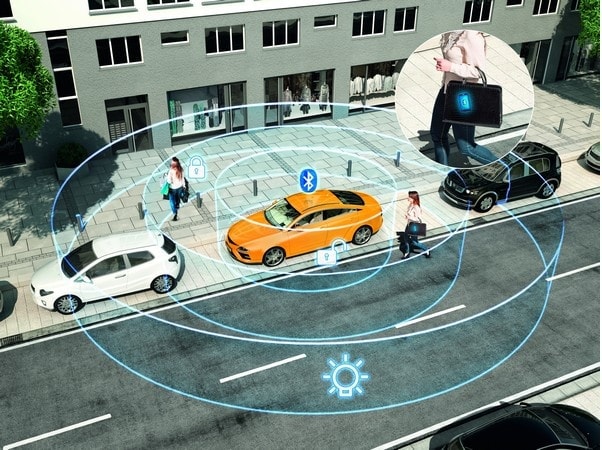It wasn’t that long ago when every car and truck required a physical key to unlock, start and drive. Those keys bulked up and weighed down pockets and purses, and were too often misplaced. And if it got lost or worse, locked inside the car, drivers were helplessly immobile until they could get another one — or break into the car to get it.
Then came remote keyless entry (RKE). Pull an RKE fob out of your pocket or purse, aim it at your vehicle within fairly close range, and it will unlock the doors, and the trunk or liftgate. Some also let you start the engine remotely to warm it up and heat or cool the cabin before you drive. These are an added convenience, but you still need a key to start and run your vehicle, and the RKE fob adds more bulk and weight. And you’re still out of luck without it.

The next generation was what technology supplier Continental calls PASE (Passive Start and Entry), which uses a fob that is detected and recognized by your vehicle while still in your purse or pocket. You walk up to the door, the vehicle knows you’re there, assumes you’re an authorized user (since you have the fob) and unlocks itself with (or some without) a touch of a button on the door handle. Some also welcome you by illuminating a light or two. Then, once it detects the fob inside the cabin, it lets you pushbutton-start the engine and drive.
All this happens with your key fob safely tucked away. Yet you’re still helpless without it.
Now visualize the same process with your smartphone replacing the fob. Continental tells us that nearly 70 percent of Americans use smartphones today, a number that increases every day. Smartphones already can communicate with some cars (mostly electrics and hybrids so far) to charge their batteries, pre-heat or cool their cabins, lock or unlock their doors and check their mechanical and electrical status, and Continental has been hard at work developing a system that will enable your smartphone (and/or smart watch) to provide full passive access to one or more vehicles while still in your purse, pouch or pocket.
"The next evolution for car manufacturers is called ‘Continental Smart Access’ and will offer hands free access and start based on Bluetooth Low Energy (BLE) technology," the company says. "The backend sends access authorization onto the driver’s smartphone over the air. BLE offers secure access by transmitting this information from the smart device to the car, which recognizes the valid key and, in the future, will unlock upon approach in order to offer additional user comfort. After entering the vehicle, the system gives authorization and the engine can be started." The phone can also upload information from the vehicle, including GPS data of its current position, whether it is locked or unlocked, tire pressures, the amount of gas in its tank and much more.
Expected to be offered by at least one U.S. automaker "in a couple of years," this will mean that we will no longer have to carry keys or fobs to lock, unlock and drive our vehicles, assuming our phones are always with us. And these virtual keys will be easily transferrable to other smart devices when we choose to share our car or truck with a friend or family member, with no need to pass around keys or fobs. Will keys and fobs become extinct? Not likely, since they’ll still be needed for occasional back-up when phones have glitches or dead batteries.
Now think about the advantage of smartphone access for fleets and car-sharing services. Fleet managers will be able to assign, move and monitor their vehicles without physical keys or fobs. Car sharing providers will be able to download a virtual key to a specific vehicle to an authorized user’s phone with a specific window of time, after which it will expire.
In a joint venture with the Belgian company D´Ieteren, Continental is also developing and implementing "OTA keys" virtual key management systems using smartphones for car sharing services, fleet operators and car rental agencies. The assigned driver uses a smartphone app to book a vehicle, and the OTA (over-the-air) keys system uses near-field communications (NFC) or BLE to send an encrypted forgery-proof data record to the phone. The virtual key, securely stored in the smartphone, then contains the access authorization for the required vehicle. Continental says this easy to install and operate OTA keys technology is already in use in several fleets in Europe and should be coming to the U.S. very soon.
Meanwhile, Volvo says it will be the world’s first automaker to offer cars without keys beginning in 2017. "Volvo customers will be offered an application for their mobile phones to replace the physical key with a digital key," the Swedish automaker asserts. "The innovative Bluetooth-enabled digital key technology will offer Volvo customers far more flexibility, enabling them to benefit from entirely new ways to use and share cars."
Volvo’s digital key will do everything a physical key (or fob) can do, including locking and unlocking doors and trunk and allowing the engine to be started, and owners will be able to send them to family members, friends or co-workers so they can also use the car. Volvo is piloting this technology in Sweden through its car-sharing firm, Sunfleet, at Gothenburg airport and plans to offer a limited number of digital-key-equipped cars to customers in 2017. Physical keys will still be offered, though, for customers who may not have (or fully trust) smartphones.







